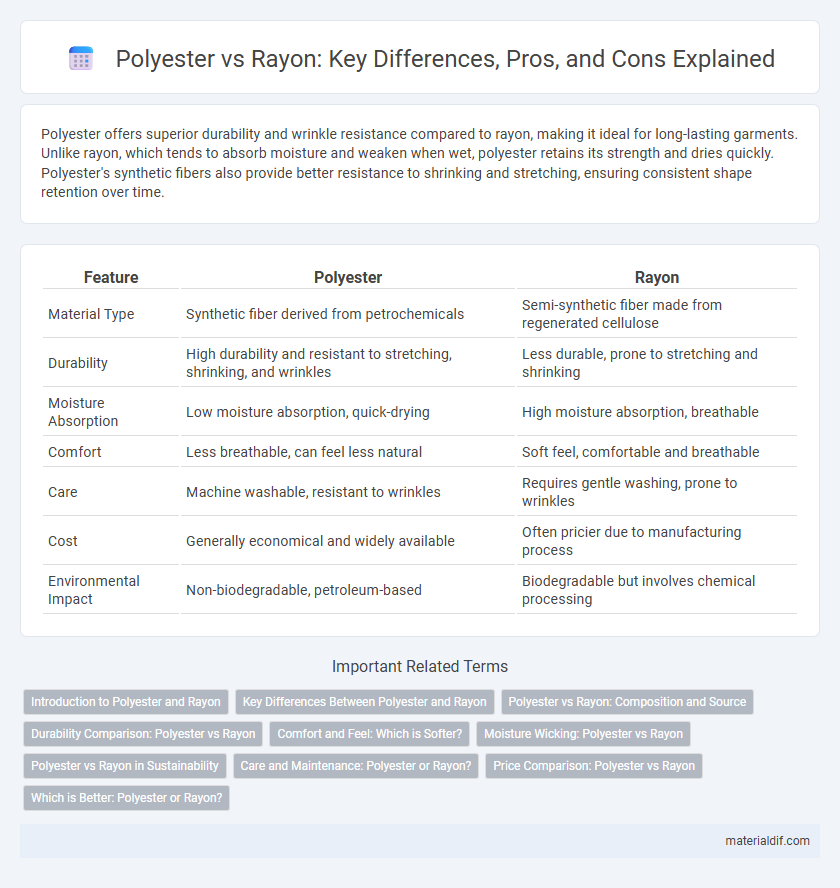Polyester offers superior durability and wrinkle resistance compared to rayon, making it ideal for long-lasting garments. Unlike rayon, which tends to absorb moisture and weaken when wet, polyester retains its strength and dries quickly. Polyester's synthetic fibers also provide better resistance to shrinking and stretching, ensuring consistent shape retention over time.
Table of Comparison
| Feature | Polyester | Rayon |
|---|---|---|
| Material Type | Synthetic fiber derived from petrochemicals | Semi-synthetic fiber made from regenerated cellulose |
| Durability | High durability and resistant to stretching, shrinking, and wrinkles | Less durable, prone to stretching and shrinking |
| Moisture Absorption | Low moisture absorption, quick-drying | High moisture absorption, breathable |
| Comfort | Less breathable, can feel less natural | Soft feel, comfortable and breathable |
| Care | Machine washable, resistant to wrinkles | Requires gentle washing, prone to wrinkles |
| Cost | Generally economical and widely available | Often pricier due to manufacturing process |
| Environmental Impact | Non-biodegradable, petroleum-based | Biodegradable but involves chemical processing |
Introduction to Polyester and Rayon
Polyester is a synthetic fiber derived from petrochemicals, known for its durability, wrinkle resistance, and moisture-wicking properties. Rayon, a semi-synthetic fiber made from regenerated cellulose, offers a soft, breathable texture with good drape similar to natural fibers. Understanding the differences in fiber origin and characteristics is essential for selecting materials in textile manufacturing and fashion design.
Key Differences Between Polyester and Rayon
Polyester is a synthetic fiber derived from petroleum, known for its durability, wrinkle resistance, and moisture-wicking properties, whereas rayon is a semi-synthetic fiber made from regenerated cellulose, offering a softer feel and better breathability. Polyester retains shape well and dries quickly, making it ideal for outdoor and activewear, while rayon tends to absorb moisture, providing comfort in warm climates but requiring more careful washing to prevent shrinkage. The environmental impact of polyester includes non-biodegradability and reliance on fossil fuels, contrasting with rayon's biodegradability but often more chemically intensive production process.
Polyester vs Rayon: Composition and Source
Polyester is a synthetic fiber derived from petrochemicals through a polymerization process, primarily composed of polyethylene terephthalate (PET). Rayon is a semi-synthetic fiber made from regenerated cellulose obtained from natural sources like wood pulp. The key distinction lies in polyester's fully synthetic origin versus rayon's natural cellulose base transformed through chemical processing.
Durability Comparison: Polyester vs Rayon
Polyester exhibits significantly higher durability than rayon due to its synthetic fiber structure, which resists stretching, shrinking, and abrasions. In contrast, rayon, a semi-synthetic fiber derived from cellulose, is more prone to wear and tear, and its strength diminishes when wet. The superior resilience of polyester makes it ideal for long-lasting garments and heavy-use textiles compared to the more delicate nature of rayon.
Comfort and Feel: Which is Softer?
Rayon typically offers a softer and more breathable feel compared to polyester, making it more comfortable for warm weather. Polyester, while durable and wrinkle-resistant, tends to feel less smooth and can trap heat and moisture. For clothing prioritizing softness and comfort, rayon is often preferred over polyester.
Moisture Wicking: Polyester vs Rayon
Polyester exhibits superior moisture-wicking properties compared to rayon, effectively drawing sweat away from the skin to the fabric's surface where it evaporates quickly, making it ideal for activewear and outdoor clothing. Rayon, being a semi-synthetic fiber derived from cellulose, tends to absorb moisture rather than wick it away, resulting in slower drying times and a heavier, damp feel during high-intensity activities. The hydrophobic nature of polyester enhances breathability and keeps the wearer dry, while rayon's higher moisture retention suits more casual, low-sweat environments.
Polyester vs Rayon in Sustainability
Polyester, primarily derived from petrochemicals, has a significant environmental footprint due to its non-biodegradability and energy-intensive production process, whereas rayon is a semi-synthetic fiber made from cellulose with better biodegradability but involves chemical-intensive manufacturing. Despite polyester's durability and recyclability through initiatives like recycled PET, rayon's sustainability depends on responsible sourcing of wood pulp and cleaner production methods such as the Lyocell process. Both fibers present sustainability challenges, with polyester offering improved recyclability options and rayon requiring advancements in eco-friendly processing to reduce environmental impact.
Care and Maintenance: Polyester or Rayon?
Polyester requires low maintenance as it is wrinkle-resistant, durable, and machine washable, making it ideal for easy care. Rayon, while soft and breathable, demands delicate handling, often needing hand washing or dry cleaning to prevent shrinking and damage. Choosing polyester over rayon ensures greater longevity and convenience in garment care and maintenance.
Price Comparison: Polyester vs Rayon
Polyester is generally more affordable than rayon due to its synthetic production process, which uses cost-efficient petroleum-based raw materials. Rayon, derived from natural cellulose, involves a more complex and labor-intensive manufacturing procedure, increasing its market price. Consumers often choose polyester over rayon for budget-friendly options in textiles and apparel without compromising durability.
Which is Better: Polyester or Rayon?
Polyester offers superior durability and moisture resistance compared to rayon, making it ideal for activewear and outdoor clothing. Rayon, derived from natural cellulose fibers, provides better breathability and softness, suitable for lightweight, comfortable garments. Choosing between polyester and rayon depends on balancing longevity and ease of care against comfort and natural fiber benefits.
Polyester vs Rayon Infographic

 materialdif.com
materialdif.com